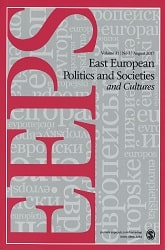From “And” to “Either/or”: Nationhood in Montenegro during the Yugoslav Twentieth Century
From “And” to “Either/or”: Nationhood in Montenegro during the Yugoslav Twentieth Century
Author(s): Pieter TrochSubject(s): Political history, Government/Political systems, Post-War period (1950 - 1989), Transformation Period (1990 - 2010), Sociology of Politics, Politics and Identity
Published by: SAGE Publications Ltd
Keywords: Montenegro; Serb-Montenegrin national polarization; Yugoslavia; multiple nationhood;
Summary/Abstract: The politicized polarization of Montenegrin society around the question of Montenegrin statehood in the context of the disintegration of the former Yugoslavia, finally leading to Montenegrin independence in 2006, is accompanied by a remarkable identity change toward a clear division between Serbian and Montenegrin nationhood. I situate this development within the long-term interference between Montenegrin and Serbian categories of identification in elite articulations of national identity in Montenegro during the twentieth century. In the early twentieth century, the Montenegrin and Serbian categories were concurrently available for national identification in the context of political modernization in the country. Reflecting the lasting political and broader societal relevance of nationhood during the Yugoslav twentieth century, diverging interpretations of the relation between both categories of nationhood have continuously substantiated political divides in Montenegro. One part of the political spectrum subordinated Montenegrin regional identity to Serbian nationhood, the other part attached increasingly far-reaching political demands to Montenegrin national identity while maintaining a sense of Serbian national identity in the domain of culture and ethnicity. In the course of the Yugoslav twentieth century, the complementary relation between both categories of nationhood was challenged by exclusive definitions of Serbian and Montenegrin nationhood, a development which has to be related to the continuous questioning of relations between various concurring categories of national identity available in Yugoslavia. The current institutionalization of Montenegrin nationhood in independent Montenegro and the development toward clear-cut Serbian and Montenegrin mono-national identities is leading to the regression of multiple nationhood among the broader population.
Journal: East European Politics and Societies
- Issue Year: 28/2014
- Issue No: 01
- Page Range: 25-48
- Page Count: 24
- Language: English
- Content File-PDF

